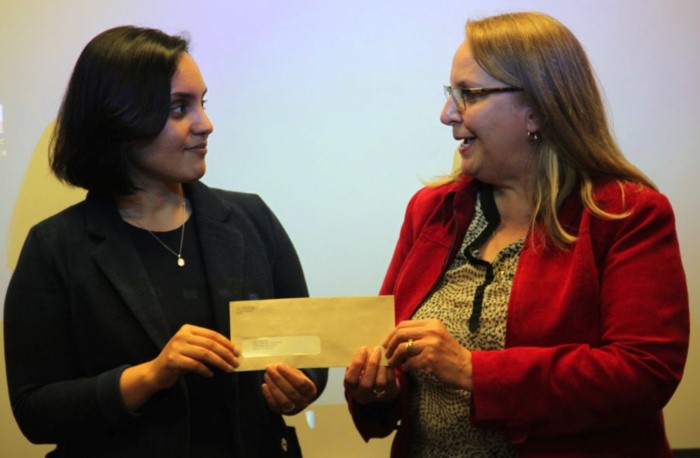STEM Girls Visit the McMaster University IIDR

“Girls can too,” is the idea behind a new program launched by the YWCA Hamilton, aimed at introducing middle-school-aged girls to the fields of science, technology, engineering, and mathematics (STEM). The initiative, called STEM Girls, aims at giving girls from low-income families opportunities to explore science and boost their confidence, prior to high school.
So what better place to go explore science, than at the University just up the road? The McMaster University Michael G. DeGroote Institute for Infectious Disease Research (IIDR) was happy to welcome 10 STEM Girls on Tuesday June 6, 2017. The room was a buzz with laughter and questions, and many of the STEM Girls could hardly wait to get into the laboratory where they would be doing some hands-on scientific experiments later that day. “Can this be my school?” asked one of the students clearly excited to be at the University.
Dr. Zeinab Hosseini-Doust, a member of the McMaster IIDR and an assistant professor in the Chemical Engineering department, presented Deborah Schwientek, manager of employment and training services at YWCA Hamilton, with a cheque for $500 in support of the STEM Girls program. “This very generous donation will help with the program costs, and help us do more activities with the girls in the future,” said Deborah, or as one of the STEM Girls simplified, “It’ll help us get down to STEM business.”
The STEM Girls took their place in the IIDR boardroom and Dr. Tracey Campbell, the IIDR research manager, gave a short presentation on what microbes are and where we find them. Many of the girls took the opportunity to ask questions about microbes, including their part in breaking down garbage, and if bacteria in your stomach could cause you to feel gassy.
After leaving the boardroom the girls headed down the hall, put on lab coats and a pair of purple gloves, and entered the Centre for Microbial Chemical Biology (CMCB) laboratory. Twenty plates were laid out on the table in front of the girls, with various bacteria growing on them. Their first challenge of the day was to match the bacteria growing on the plates, to the location in the building where the swabs were collected. Many of the girls gasped in disbelief as it was revealed that a toilet seat had much less bacteria on it than one of the IIDR keyboards! Then it was their turn to swab what they thought would be fun locations and culture the bacteria on plates, which they allowed to grow overnight.
Later on in the afternoon the girls listened to a second short presentation on drug resistance, and what they can do to help stop the spread. Heading down to the lab for one last experiment, the STEM Girls stained bacteria and were able to observe the cells using a microscope. To remember their time here, the STEM Girls received one last surprise from the institute, a grab bag that included a McMaster clip board, an IIDR note pad, an IIDR mug, and some take home reading material on drug resistance as well as Zika virus, influenza, and pneumonia.
The STEM Girls program is a long-term outreach endeavor by the YWCA Hamilton and is funded by the Hamilton Community Foundation’s ABACUS initiative. What makes this program especially unique is their long-term commitment to the students, as they will work with the same girls over a 2+ year period, not only providing mentors, and hand-on experience, but also guidance to open their eyes to post secondary education and career opportunities in these fields.
As we said our goodbyes that afternoon, something inside tells me that we will definitely be seeing some of these amazing young women here at McMaster University in the not-so-distant future. Wishing you all the best, and hope to see you soon STEM Girls!
NewsRelated News
News Listing

McMaster Health Sciences ➚
Overcoming resistance: McMaster researchers find new utility for old antibiotics
News
January 6, 2025

December 19, 2024


